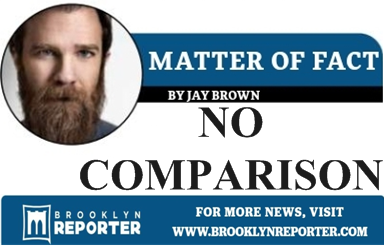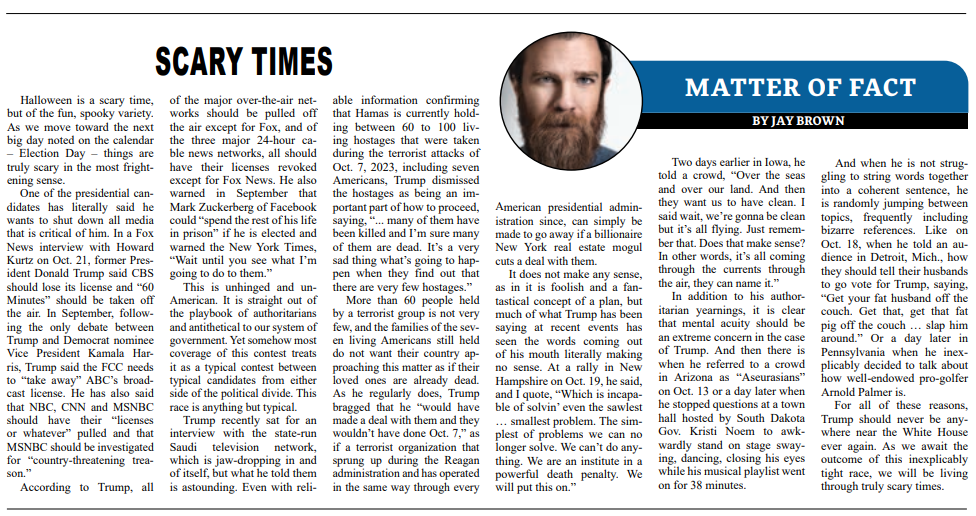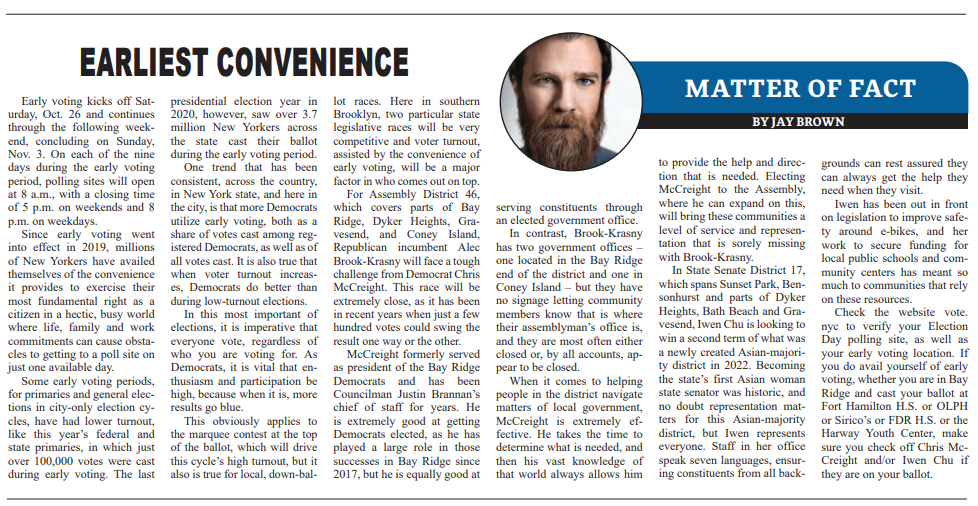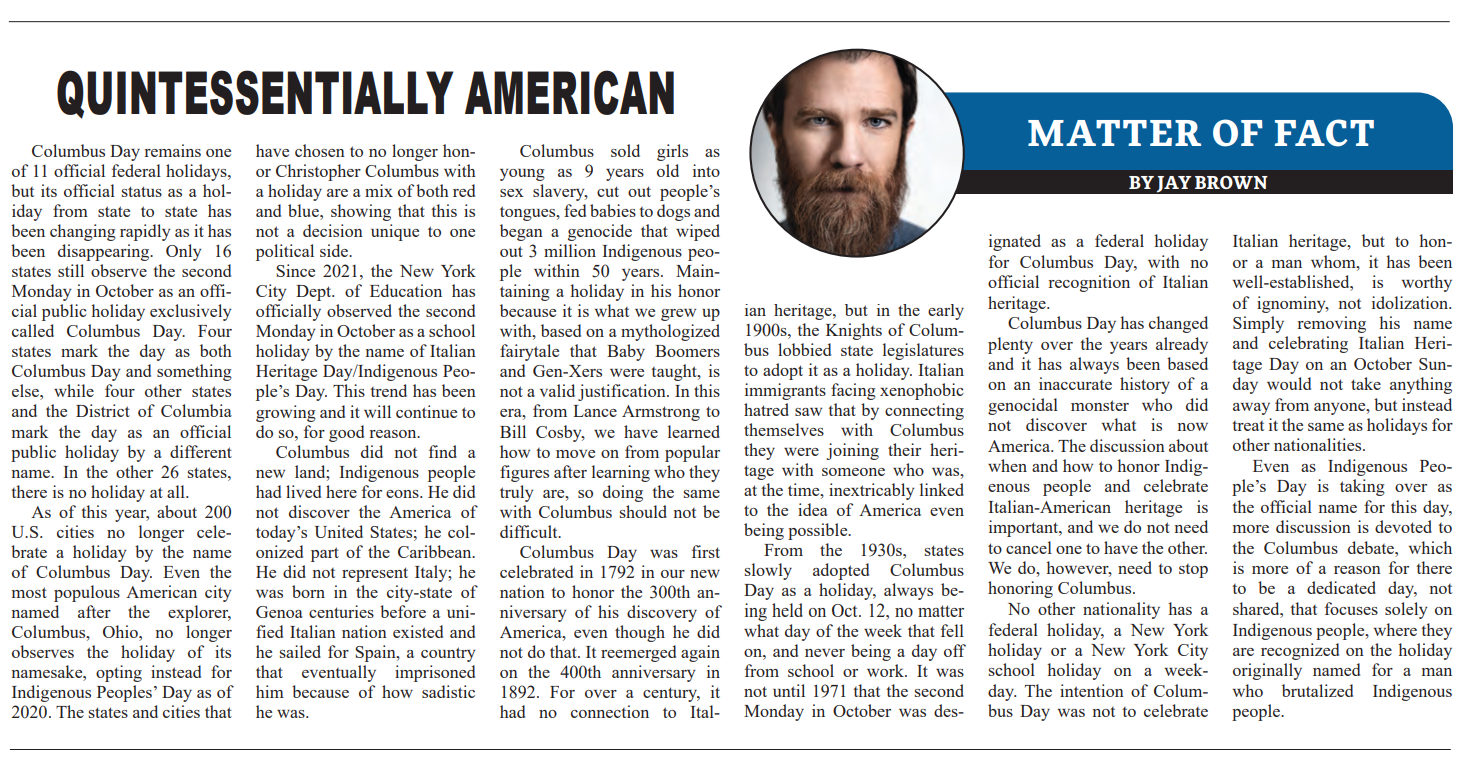This column, from the weekly opinion piece MATTER OF FACT, first appeared on BrooklynReporter.com, and in the Home Reporter and Spectator newspapers dated August 21, 2020
On August 9, a Facebook post from Assemblyman William Colton drew a comparison between the Black Lives Matter movement and the Klu Klux Klan, stating that they are both “hate groups.”
A movement based on the idea that the lives of black Americans should matter is not hateful. There is no reasoning that allows someone to equate BLM with the KKK that is not rooted in complete ignorance or in racism.
When asked about the post a few days later, Colton walked back his characterization of Black Lives Matter as a hate group, but added, “I think initially the KKK, when it was formed, they were well-intentioned people who felt they were hurt, discriminated against.”

The Ku Klux Klan was formed in the deep south during the era of Reconstruction, following the Civil War. Its sole purpose was to inflict violence upon black Americans to intimidate them from exercising their newly granted right to vote. Those are not the actions of well-intentioned people. Outrage that former slaves were suddenly allowed to vote and run for office was not discrimination against white southerners.
Colton had addressed the controversy over his BLM/KKK comparison by voicing support for both the Black Lives Matter movement and for the founders of the Ku Klux Klan. After further backlash from that statement, the Assemblyman issued an apology via Facebook, wherein he denounced the Ku Klux Klan and expressed support for the Black Lives Matter movement, but he offered no explanation as to why he originally equated the two or why he then explained it by saying those who formed the KKK were well-intentioned.
Colton’s district comes within one block of 20th Avenue and Bay Ridge Avenue, where Yusuf Hawkins was murdered 31 years ago. Sunday, August 23 marks the anniversary of his killing. His fatal mistake was being a 16-year old black boy who entered Bensonhurst in 1989.
Last week, the film Yusuf Hawkins: Storm Over Brooklyn debuted on HBO. Filmmaker Muta’Ali Muhammad’s documentary about Yusuf’s murder and what ensued is a sobering look back at a disturbing time.
“There can be no equivocation on hate or on those who seek to oppose it or on the vast difference between the two. Especially not from our elected leaders. Especially not in Bensonhurst.”
I wrote just one month ago about how recent physical and verbal attacks against Black Lives Matter counter-protesters in Dyker Heights brought back memories of hateful vitriol I witnessed as a boy in Bensonhurst when protesters marched through my neighborhood following Hawkins’ murder. The film’s footage of the sheer hate on display in broad daylight in 1989 brought my fading memories of that shameful time into focus.
Black protesters were taunted with watermelons. One Bensonhurst resident is seen proudly exclaiming, “This is not a racist community. We just don’t like black people, that’s all.” Mayor Koch is seen saying, “This is not a community that should be described as a racist community.”
I grew up in Bensonhurst during that time. It was an incredibly racist community. Nobody can see how hordes of community members responded to those marching in response to the senseless murder of a black boy, killed because of the color of his skin, and say otherwise. The complexion of the neighborhood has changed and the blight of racism has receded from what it was three decades ago, but remnants linger.
The film shows one Bensonhurst resident addressing the murder by saying, “Things happen, but don’t make a big deal out of it because if you make a big deal, you know what’s gonna happen. They’re gonna come down and we’re gonna start, they’re gonna start and there’s gonna be a big thing, right? So, if we keep it low and forget about it, you know, maybe it’ll just die down.”
This man wanted people to just forget that a child was murdered and not make a big deal about it. In the weeks following the murder, Mayor Koch seemed to want people to forget about it and not believe racism existed in an area where it was epidemic. A few weeks later he lost a primary race he had led by a wide margin a month earlier.
There can be no equivocation on hate or on those who seek to oppose it or on the vast difference between the two. Especially not from our elected leaders. Especially not in Bensonhurst.




